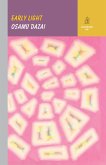A modern amorality play about a 17-year-old girl, the wilder shores of connoisseurship, and the power of false friends
Maman was exigeantethere is no English wordand I had the benefit of her training. Others may not be so fortunate. If some other young girl, with two million dollars at stake, finds this of use I shall count myself justified.
Raised in Marrakech by a French mother and English father, a 17-year-old girl has learned above all to avoid mauvais ton ("bad taste" loses something in the translation). One should not ask servants to wait on one during Ramadan: they must have paid leave while one spends the holy month abroad. One must play the piano; if staying at Claridge's, one must regrettably install a Clavinova in the suite, so that the necessary hours of practice will not be inflicted on fellow guests. One should cultivate weavers of tweed in the Outer Hebrides but have the cloth made up in London; one should buy linen in Ireland but have it made up by a Thai seamstress in Paris (whose genius has been supported by purchase of suitable premises). All this and much more she has learned, governed by a parent of ferociously lofty standards. But at 17, during the annual Ramadan travels, she finds all assumptions overturned. Will she be able to fend for herself? Will the dictates of good taste suffice when she must deal, singlehanded, with the sharks of New York?
Maman was exigeantethere is no English wordand I had the benefit of her training. Others may not be so fortunate. If some other young girl, with two million dollars at stake, finds this of use I shall count myself justified.
Raised in Marrakech by a French mother and English father, a 17-year-old girl has learned above all to avoid mauvais ton ("bad taste" loses something in the translation). One should not ask servants to wait on one during Ramadan: they must have paid leave while one spends the holy month abroad. One must play the piano; if staying at Claridge's, one must regrettably install a Clavinova in the suite, so that the necessary hours of practice will not be inflicted on fellow guests. One should cultivate weavers of tweed in the Outer Hebrides but have the cloth made up in London; one should buy linen in Ireland but have it made up by a Thai seamstress in Paris (whose genius has been supported by purchase of suitable premises). All this and much more she has learned, governed by a parent of ferociously lofty standards. But at 17, during the annual Ramadan travels, she finds all assumptions overturned. Will she be able to fend for herself? Will the dictates of good taste suffice when she must deal, singlehanded, with the sharks of New York?
Dieser Download kann aus rechtlichen Gründen nur mit Rechnungsadresse in A, D ausgeliefert werden.









